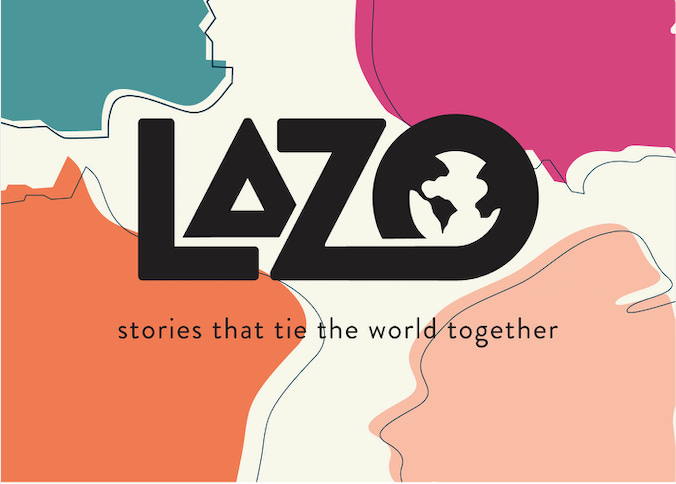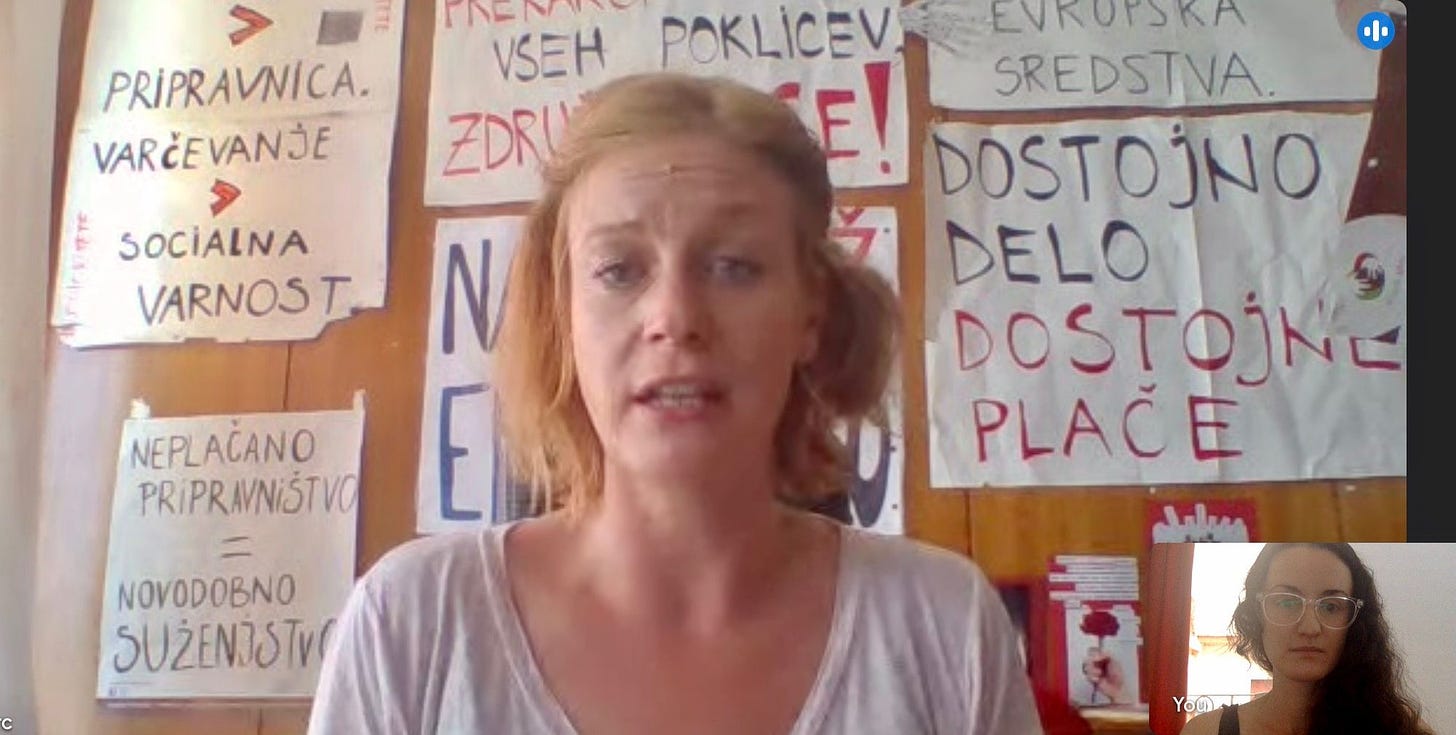Slovenia in focus.
Hello! Cristina here. I am back in the U.S. after a my oh-so-brief trip to Spain.
Following our launch last week, my friend Mark kindly pointed out that there's a book called The Lazlo Letters, which I would very much like to read. For the record, I did not know this book existed when I picked the name of this newsletter, and I am grateful for the stray Z that will keep me out of any lawsuits.
Mark also launched a very cool project recently called Rorshock, which brings short audio updates from countries around the world. I'm sharing it here because it fits so well with the theme of this newsletter, which is to unite people across borders through stories and information.
This week I sat down (via Skype or Zoom or something) with Tea Jarc, a trade union leader and activist from Slovenia. We discuss the protest movement in her country and why Slovenia is becoming Europe's newest problem child.
Slovenia is a Central European country with a little over 2 million inhabitants. It gained independence from Yugoslavia in 1991. The current Prime Minister Janez Janša has been accused of cracking down on press freedom and the rule of law.
This interview has been lightly edited for clarity.
Cristina: So, to kick off, why don't you tell me a little bit about your labor union and the protest movement?
Tea: I'm the President of a trade union in Slovenia called Mladi Plus, which is a trade union for students, young unemployed people, and young precarious workers. We're unique on European and global levels.
Our trade union joined the protest movement that started in April last year. We're now one of the organizations officially supporting the protest movement.
In Slovenia, in March 2020, as soon as the coronavirus pandemic hit, we got a new government. The previous government collapsed, and we all thought we would have early elections. But that didn't happen. Instead, a new coalition was formed by the leader of the right, Janez Janša. He is now Prime Minister.
At the time, people were very outraged about the lack of elections and they wanted to protest. But it was March 2020, and we were in lockdown. We weren't allowed to gather in the streets, we weren't allowed to express ourselves, so everything formed very spontaneously. People began putting posters up in their windows and on balconies. People wanted to express their frustration.
We knew immediately that the new government would start using the pandemic to push through its agenda. They started to attack the media. They also increased their salaries during their first week [in government] and started attacking non-governmental organizations (NGOs), including environmental organizations and trade unions.
Prime Minister Janez Janša isn't new to Slovenian politics. He has been Prime Minister twice. He is a convicted criminal charged with corruption. So people were outraged. We didn't want him.
Cristina: How did Prime Minister Janša return to power?
Tea: When the previous government collapsed right before the pandemic, Janez Janša said there was no need to hold new elections because he could form a government.
He managed to convince two parties that were in the center-left government to join the right-wing government. That's why people were so pissed off. They never voted for a coalition with Janez Janša.
Members of parliament joined Janša because they wanted to keep their jobs and remain in power.
Now the current government has lost its majority. It doesn't have the 46 votes needed [to pass legislation], but neither does the opposition. So every month,, when they are deciding on legislation, we don't know what's going to happen. There is so much horse-trading.
Cristina: Can you tell me about the referendum on access to water held on July 11?
Tea: A few months ago, the government proposed new legislation that would limit public access to Slovenia's water supply. They didn't consult with NGOs or environmental organizations or anyone, which they should do according to Slovenian law. There must be a public hearing.
We had the option to call for a referendum if we could get enough signatures. We started collecting signatures, and the government was forced to hold a referendum on the issue.
In this case, civil society won with a huge majority. Over 86% of voters voted against this legislation. In Slovenia, at least 340,000 people must vote against a law to stop it, and in this case, 670,000 people voted against it.
This was a referendum on the government. Civil society and the majority of people in Slovenia are united.
Around 70% of the population supports the protests and is against the government. But we are held hostage by a couple of people in the parliament who are trading their votes.
Cristina: What will happen with the water law after the referendum?
Tea: It can't come into force. It won't be adopted. For at least one year,, they can't propose any other legislation on this issue. Nothing improved, but at least we managed to protect access to water.
Cristina: I'd like to hear more about the situation with the media in Slovenia. I understand that Prime Minister Janša cut funding to the state news agency STA. What was the impact of that, and how concerned are you?
Tea: This is a super problematic situation. The first week in government, Janša started attacking the media. They call the media "the mainstream media" and say that it's corrupt and in bed with the communists and the deep state.
Janša is living in his own reality where he is the victim, and everyone is part of the communist conspiracy against him, so he is attacking the media. He is doing it successfully because he can cut government funds to state media. That's what he did in the case of STA, our national press agency.
We went to Slovenian courts, and they said the government has to fund the national press agency. The European Commission said the same thing.
In the meantime, the government wasn't funding STA, and journalists were working for several months without their salaries.
Civil society in Slovenia is powerful and very united. There was a fundraising effort, and we gave our own money to STA, even though we are already supporting it through our taxes. We managed in one month to collect over 200,000 euros to pay journalists. It was a sign of solidarity, and it was shocking we could collect so much money in such a short time.
Janša also attacked that effort, and he called journalists prostitutes.
Cristina: Have there been many attacks against individual journalists or attempts to control the independent media?
Tea: Janša is tweeting a lot, and his language is very aggressive. He is also trying to control the media.
There is this one TV station that is connected to Hungary, because Janša is a very good friend of [Hungarian Prime Minister Viktor] Orbán. Nova 24 is Hungarian media and it is operating as if it were the governmental media station in Slovenia now.
Janša is refusing to give any interviews to the other stations. That station is his weapon to spread any message he wants. Now he is attacking other journalists, attacking citizens. They are producing so many fake articles about us individuals who are protesting.
Cristina: What do you make of Janša's refusal to acknowledge Slovenia's two candidates for the European Public Prosecutor’s Office (EPPO)?
Tea: That is something that went through all of the normal democratic procedures. They were nominated by an independent body of prosecutors. That is the process, and that is how it is done in all European Union countries. But Janez Janša didn't like those prosecutors, so he stopped the process.
After they were already selected, he said that he's not going to send their names to the European level and that he's going to repeat the whole procedure for choosing prosecutors.
It's not his job to choose those people. That is against Slovenian law, and it's against the European rules and procedures. So right now, there are lawsuits happening in Slovenia. Those two people already filed lawsuits saying that Janša violated the rule of law.
Janša wants to control everything because he feels threatened. The role of those prosecutors, of course, would be to look at European funding, where the money goes, how it's being managed, and if there is corruption.
For us, this is a sign that there could be corruption. Janša is a person who has been convicted of corruption, and now he doesn't want oversight from prosecutors.
Cristina: What would you like to see happen during the next few months in Slovenia?
Tea: The main call from the protest movement is that we deserve early elections. This government is not democratically elected. It's jeapordizing democracy and the rule of law in Slovenia.
We want to protect the democratic system and European values.
Thanks to Tea for sharing her time and insights with me. We'll continue to watch events unfold in Slovenia.
What I'm reading:
• Rwandan soldiers arrived in Mozambique to fight against extremists linked to the Islamic State, the Guardian reports. The fighting took place near Mozambique’s border with Tanzania.
• Moroccan authorities arrested a Uyghur activist in exile, Yidiresi Aishan, because of a Chinese terrorism warrant distributed by Interpol, according to information from Moroccan police and a rights group.
• Samoa has its first female Prime Minister following several months of political uncertainty.
• Poland and Hungary are in a standoff with the European Union over coronavirus recovery funds, which they might not receive if they don't start fighting corruption and protecting the rule of law, according to Politico.
• Tunisia's democracy is on the verge of collapse after President Kais Saied suspended the legislature and fired the Prime Minister, AP reports. Apparently people in Tunisia are happy about it, since the previous Prime Minister was so unpopular.
• Influential voices in Egypt, Saudi Arabia, and the United Arab Emirates are celebrating the events in Tunisia, arguing they are the end of political Islam in democracy, according to the Washington Post.
•Nicaragua has arrested nearly every.single.person who would challenge Daniel Ortega in November presidential elections.
• The U.S. has suspended cooperation with Guatemala’s Attorney General Office after the office’s top anti-corruption prosecutor was fired.
• VICE profiles Generation Identity, an influential far-right youth movement active in Europe.
• Jared Kushner is opening an investment firm that will pursue opportunities in the Middle East, and reporters covering corruption and money laundering are sharpening their knives.
• A new report by Human Rights Watch says Israel committed war crimes during the May conflict in Gaza.
• Armenian Prime Minister Nikol Pashinyan has requested that Russian border outposts be stationed along Armenia’s border with Azerbaijan to prevent increased tensions between the two countries, Reuters reports.
• Top Israeli officials are angry about Ben and Jerry's ice cream.
• Check out this video by Human Rights Watch on Myanmar's crackdown on the press.






